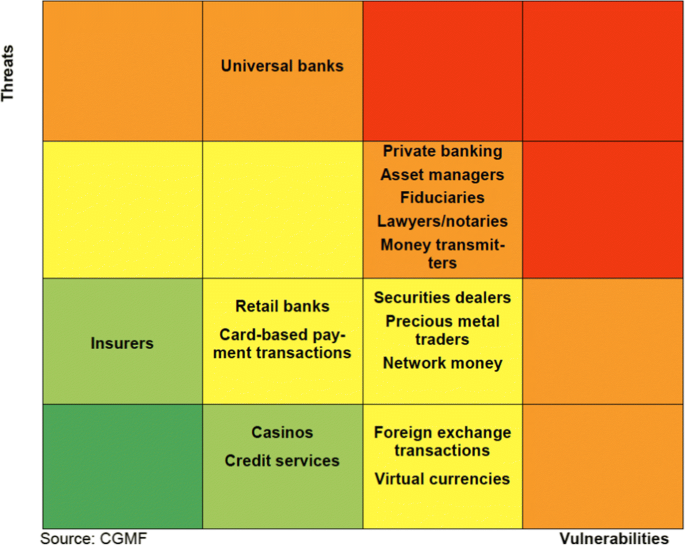Casino Money Laundering Risk

A U.S. casino industry group this month updated its guidance on anti-money laundering (AML) obligations to take account of developments that include the expansion of the U.S. sports betting market, interactive mobile gaming, and customers with potential ties to marijuana-related businesses.
Cracks down on money laundering, Ontario casinos risk becoming ground zero – Jan 29, 2020 READ MORE: Ontario casino regulator probing whether B.C. Casino staff were connected to.
The newest version of the American Gaming Association’s (AGA’s) “Best Practices for Anti-Money Laundering Compliance” reflects “takeaways” from enforcement actions and guidance from the U.S. Treasury’s Financial Crimes Enforcement Network (FinCEN), the U.S. National Money Laundering Risk Assessment, as well as updated compliance guidelines from the Treasury’s Office of Foreign Assets Control, an association spokeswoman told Thomson Reuters Regulatory Intelligence.

- The report identifies the five most common types of money laundering as cash, banking, money services businesses, casinos and securities. To fight money laundering, FinCEN Director Calvery says, casinos need to assess where people get their money, particularly in high-risk jurisdictions where criminal activity and money laundering are common.
- Casinos, similar to banks and other areas of the Canadian economy which may be vulnerable to money laundering, are closely regulated with respect to money laundering and terrorist financing risks.
For more on casinos’ compliance with Title 31, see our previous blog series.
The stated goal of the document is to provide a resource for the gaming industry and other financial sectors that are required to comply with the Bank Secrecy Act (BSA), the primary U.S. anti-money laundering law. It also aims to serve as a tool for government and law enforcement “to help guide their efforts to protect the gaming industry and the broader financial system from money launderers and others involved in illegal activity.”
Changes in the Guide include:
- An emphasis on a strong culture of compliance and the importance of industry engagement with government and law enforcement;
- A deepened analysis and updated recommendations covering new and emerging forms of gaming, including the expanding U.S. sports betting market and interactive mobile gaming;
- A strengthened and expanded Know Your Customer / Customer Due Diligence section;
- An emphasis on the importance of participating in the PATRIOT Act 314(b) industry information-sharing program;
- A more robust risk assessment section, with recommendations on evaluating whether a patron may have ties to a marijuana-related business; and
- A focus on the importance of including all readily available patron information for BSA reporting.
When it comes to the development and maintenance of a compliance culture, there “is no more effective way to foster a positive culture” than to have the casino’s senior leadership and board of directors “engaged in the AML compliance effort,” the document states.
The AGA Guide states further that such individuals should receive periodic updates on regulatory developments, changes to the program, resources, and audit findings by regulators and others. The document also states that many casinos have opted to engage in voluntary information-sharing with other financial institutions pursuant to Section 314(b) of the USA PATRIOT Act. “This program, and other formal and informal information sharing mechanisms, is a FinCEN priority and is a vital way to ensure casinos and other financial institutions can obtain necessary information about their patrons and customers,” the Guide states.
Casino Money Laundering Risk Assessment
The document also addresses the need for ample risk assessment. For instance, it suggests that casinos probe whether a patron has ties to a state-licensed and regulated cannabis business and update their compliance programs to include a policy outlining how to address such individuals. When such concerns arise, casinos should consider reviewing any previous transactions involving the customer that may appear suspicious in light of the additional information, and should determine how to review future activity, the document adds.
Country risks also should be taken into account, the report states. Customers with casino accounts “may be deemed to present a higher risk if the casino learns that they are non-resident aliens or foreign nationals or residents of countries that have been defined by the United States as jurisdictions of concern for narcotics trafficking, human trafficking, money laundering, terrorism, or other forms of illicit finance,” the Guide states, adding that the risk is especially noteworthy if the foreign nation has been identified as non-cooperative by the international AML-standard-setting Financial Action Task Force, or if the country has been identified by Transparency International or “a similar reputable organization” as having a high level of public corruption.
Addressing the Rise of Interactive Gaming
With regard to interactive gaming, casinos may rely on third parties for verification of certain information such as Social Security numbers and player age, the document states. It adds, however, that casinos “cannot delegate their BSA / AML responsibilities” and notes that contracts with third parties should clearly identify BSA / AML responsibilities and allow the casino to perform periodic reviews to ensure compliance with the law.

It also identities red flags that may be associated with interactive gaming, such as multiple gaming accounts being set up from the same IP address or physical address, or unusual patron behaviors based on geo-location data, such as traveling between jurisdictions in a relatively short period of time.
Casino Money Laundering Risk
Casinos have been defined as “financial institutions” under the BSA since 1985. They must file Currency Transaction Reports (CTRs) when a patron either provides the casino with or takes away from the casino more than $10,000 in currency during a 24-hour gaming day. Casinos also must file Suspicious Activity Reports (SARs) when a casino knows, suspects, or has reason to suspect that a transaction or attempted transaction is linked to illicit activity, or when it is simply inexplicable.
FinCEN shook up the casino industry under the leadership of Director Jennifer Shasky Calvery, who after taking the Treasury bureau’s reins in 2012, prioritized a high-profile push to force the casino industry to more rigorously comply with the BSA.
The AGA released its first AML best practices document in December 2014; and the second iteration came at the end of 2015, a year in which FinCEN levied civil penalties totaling $93 million against casinos accused of operating with anti-money laundering weaknesses.